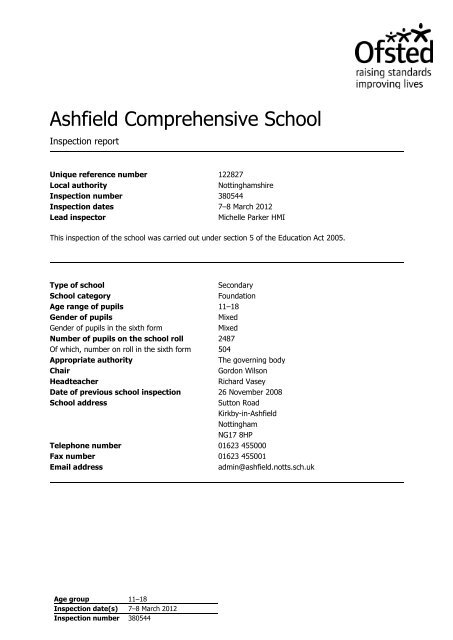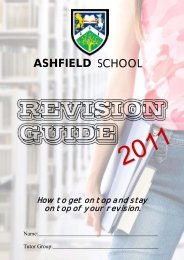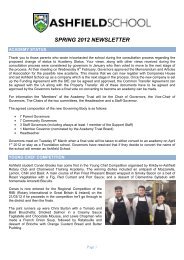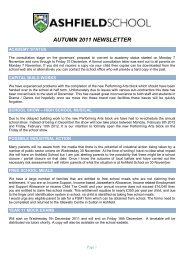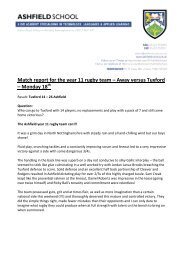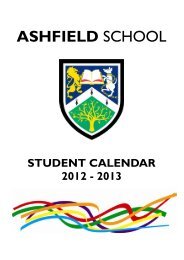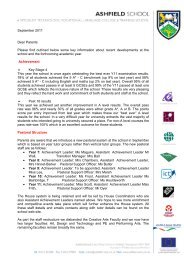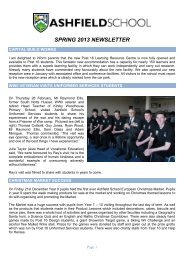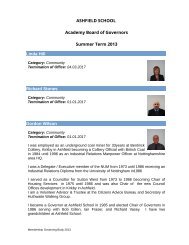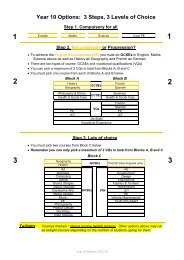Download our Latest Ofsted Report Here - Ashfield School
Download our Latest Ofsted Report Here - Ashfield School
Download our Latest Ofsted Report Here - Ashfield School
Create successful ePaper yourself
Turn your PDF publications into a flip-book with our unique Google optimized e-Paper software.
<strong>Ashfield</strong> Comprehensive <strong>School</strong><br />
Inspection report<br />
Unique reference number 122827<br />
Local authority<br />
Nottinghamshire<br />
Inspection number 380544<br />
Inspection dates 7–8 March 2012<br />
Lead inspector<br />
Michelle Parker HMI<br />
This inspection of the school was carried out under section 5 of the Education Act 2005.<br />
Type of school<br />
Secondary<br />
<strong>School</strong> category<br />
Foundation<br />
Age range of pupils 11–18<br />
Gender of pupils<br />
Mixed<br />
Gender of pupils in the sixth form<br />
Mixed<br />
Number of pupils on the school roll 2487<br />
Of which, number on roll in the sixth form 504<br />
Appropriate authority<br />
The governing body<br />
Chair<br />
Gordon Wilson<br />
Headteacher<br />
Richard Vasey<br />
Date of previous school inspection 26 November 2008<br />
<strong>School</strong> address<br />
Sutton Road<br />
Kirkby-in-<strong>Ashfield</strong><br />
Nottingham<br />
NG17 8HP<br />
Telephone number 01623 455000<br />
Fax number 01623 455001<br />
Email address<br />
admin@ashfield.notts.sch.uk<br />
Age group 11–18<br />
Inspection date(s) 7–8 March 2012<br />
Inspection number 380544
Inspection report: <strong>Ashfield</strong> Comprehensive <strong>School</strong>, 7–8 March 2012 2 of 12<br />
You can use Parent View to give <strong>Ofsted</strong> y<strong>our</strong> opinion on y<strong>our</strong> child’s school.<br />
<strong>Ofsted</strong> will use the information parents and carers provide when deciding<br />
which schools to inspect and when.<br />
You can also use Parent View to find out what other parents and carers think<br />
about schools in England. You can visit www.parentview.ofsted.gov.uk, or<br />
look for the link on the main <strong>Ofsted</strong> website: www.ofsted.gov.uk<br />
The Office for Standards in Education, Children's Services and Skills (<strong>Ofsted</strong>) regulates and inspects to<br />
achieve excellence in the care of children and young people, and in education and skills for learners of<br />
all ages. It regulates and inspects childcare and children's social care, and inspects the Children and<br />
Family C<strong>our</strong>t Advisory Support Service (Cafcass), schools, colleges, initial teacher training, work-based<br />
learning and skills training, adult and community learning, and education and training in prisons and<br />
other secure establishments. It assesses council children’s services, and inspects services for looked<br />
after children, safeguarding and child protection.<br />
Further copies of this report are obtainable from the school. Under the Education Act 2005, the school<br />
must provide a copy of this report free of charge to certain categories of people. A charge not<br />
exceeding the full cost of reproduction may be made for any other copies supplied.<br />
If you would like a copy of this document in a different format, such as large print or Braille, please<br />
telephone 0300 123 4234, or email enquiries@ofsted.gov.uk.<br />
You may copy all or parts of this document for non-commercial educational purposes, as long as you<br />
give details of the s<strong>our</strong>ce and date of publication and do not alter the information in any way.<br />
To receive regular email alerts about new publications, including survey reports and school inspection<br />
reports, please visit <strong>our</strong> website and go to ‘Subscribe’.<br />
Piccadilly Gate<br />
Store St<br />
Manchester<br />
M1 2WD<br />
T: 0300 123 4234<br />
Textphone: 0161 618 8524<br />
E: enquiries@ofsted.gov.uk<br />
W: www.ofsted.gov.uk<br />
© Crown copyright 2012
Inspection report: <strong>Ashfield</strong> Comprehensive <strong>School</strong>, 7–8 March 2012 3 of 12<br />
Introduction<br />
Inspection team<br />
Michelle Parker<br />
Jerry Seym<strong>our</strong><br />
Deloris Reviere<br />
Champak Chauhan<br />
Bob Roberts<br />
Her Majesty’s Inspector<br />
Additional inspector<br />
Additional inspector<br />
Additional inspector<br />
Additional inspector<br />
This inspection was carried out with two days’ notice. Inspectors observed 44<br />
teachers and 44 lessons, including 26 joint observations with members of the senior<br />
leadership team. Meetings and discussions were held with groups of students and<br />
members of the governing body, parents and carers, and the school staff, including<br />
senior and middle managers. Inspectors took account of the responses to the on-line<br />
questionnaire (Parent View) in planning the inspection, observed the school’s work,<br />
and looked at the school development plan, minutes of the governing body<br />
meetings, documents relating to safeguarding, and teaching records. Inspectors<br />
analysed 811 questionnaires from parents and carers, in addition to those completed<br />
by students and staff.<br />
Information about the school<br />
<strong>Ashfield</strong> Comprehensive is much larger than the average secondary school. The<br />
majority of students are White British. The remainder come from a small range of<br />
different ethnic heritages. The proportion of disabled students and those who have<br />
special educational needs is below average. The proportion of students known to be<br />
eligible for free school meals is broadly average. The school meets the government’s<br />
current floor standards, which set minimum requirements for students’ attainment<br />
and progress. The school has specialisms in technology, languages and vocational<br />
studies. It is also a designated training school.
Inspection report: <strong>Ashfield</strong> Comprehensive <strong>School</strong>, 7–8 March 2012 4 of 12<br />
Inspection judgements<br />
Overall effectiveness 2<br />
Achievement of pupils 2<br />
Quality of teaching 2<br />
Behavi<strong>our</strong> and safety of pupils 2<br />
Leadership and management 1<br />
Key findings<br />
<br />
<br />
<br />
<br />
<br />
This is a good school. The sixth form is good, with outstanding leadership. The<br />
school has many strengths, and teaching and achievement have improved since<br />
the last inspection as a result of outstanding leadership and management. The<br />
school is not yet outstanding because not enough teaching ensures that all<br />
groups of students make outstanding academic progress. The curriculum,<br />
although good, does not prepare them fully for life in multicultural, multifaith<br />
modern Britain.<br />
Achievement is good for all groups of students, thanks to good teaching that<br />
engages and motivates them. Gaps against national figures are closing rapidly<br />
for different groups of students, but this is not yet fully reflected in students’<br />
attainment over time. The sixth-form leaders are rightly focusing on ensuring<br />
that more students gain A* to B grades.<br />
The majority of teaching is good. Outstanding leadership of teaching has helped<br />
staff to develop their expertise through coaching and high-quality professional<br />
development. Performance management systems hold all staff to account<br />
effectively for students’ progress. Students comment on how well they are<br />
supported in their learning. Teaching usually provides good challenge but it is<br />
not always fine-tuned to really stretch students of different abilities.<br />
Behavi<strong>our</strong> around the school and in lessons is good. Students commented on<br />
the prompt action by staff to tackle less desirable behavi<strong>our</strong>. The school is very<br />
responsive in keeping students safe. Students enjoy coming to school. They are<br />
punctual, and attendance is above average.<br />
The school provides good moral, ethical and social activities but misses<br />
opportunities to promote spiritual and cultural learning. The curriculum has<br />
improved greatly and makes a strong contribution to outcomes for vulnerable<br />
students. The good range of c<strong>our</strong>ses are matched well to students’ interests.<br />
The vocational c<strong>our</strong>ses provide good opportunities for pathways into further<br />
learning, training and employment.
Inspection report: <strong>Ashfield</strong> Comprehensive <strong>School</strong>, 7–8 March 2012 5 of 12<br />
What does the school need to do to improve further?<br />
<br />
<br />
Ensure a greater proportion of teaching is outstanding by fine-tuning the way<br />
lesson activities are targeted to students of different abilities, so that all groups<br />
of students make a minimum of three levels of progress in every subject from<br />
joining the school to the end of Key Stage 4, and more sixth-form students gain<br />
A* to B grades.<br />
Increase the opportunities for spiritual and cultural learning to ensure that<br />
students have a better awareness of modern multicultural Britain.<br />
Main report<br />
Achievement of pupils<br />
The proportion of students gaining five A* to C GCSE grades, including English and<br />
mathematics, is in line with national averages. This indicates good progress because<br />
students enter the school with below-average attainment. Improvements in<br />
mathematics had lagged behind those in English, but the school has now addressed<br />
weaknesses effectively and all students were making good progress in the<br />
mathematics lessons observed, as well as in English. The strategies to support and<br />
improve students’ literacy and numeracy skills across the curriculum are bearing fruit,<br />
and the work sampled demonstrated secure improvements in students’ writing and<br />
spelling, in their use of technical and key words, and in their understanding of<br />
mathematical concepts. Senior leaders are acutely aware of the weaker performance<br />
of a few subjects, such as French and geography, and are taking urgent and<br />
effective action to address them through the work of the 'leaders' for learning’ and<br />
TLR post holders (teaching and learning responsibilities, middle leaders) in every<br />
faculty. These staff closely monitor the progress of all students and are particularly<br />
successful in raising the achievement of vulnerable groups. Parents and carers are<br />
rightly pleased with the progress their children make.<br />
The school has identified weaker performance in certain groups of students, such as<br />
boys relative to girls, students known to be eligible for free school meals, and those<br />
with special educational needs at the ‘school action plus’ stage (those needing<br />
external support). A range of successful strategies have been employed to rectify<br />
these weaknesses. For example, the school is now running booster sessions for those<br />
who are underperforming. In addition, every teacher is now held accountable for the<br />
progress of every student they teach. The special educational needs coordinator<br />
focuses very closely on narrowing gaps in attainment or progress for any students<br />
identified as underperforming. To this end, the support provided by teaching<br />
assistants has been reorganised and specialist training provided so that they now<br />
confidently and effectively fulfil their role.<br />
Achievement in the sixth form is good. Some students join the sixth form having<br />
previously underachieved, and the school rigorously addresses this through carefully<br />
targeted interventions. The pass rate at A level is in line with the national average,<br />
and at AS level slightly higher. Teachers are rightly focusing on increasing the
Inspection report: <strong>Ashfield</strong> Comprehensive <strong>School</strong>, 7–8 March 2012 6 of 12<br />
percentage of students reaching the higher A* to B grades.<br />
Quality of teaching<br />
Parents and carers are rightly and overwhelmingly positive about the quality of<br />
teaching. Teachers interest, motivate and engage the vast majority of students well.<br />
The pace of learning in lessons is good. Teachers use a wide range of strategies to<br />
enc<strong>our</strong>age students to assess their own work. Feedback during lessons helps<br />
students understand how to improve their work and to ascertain the next steps in<br />
learning, although written feedback in marking is not so consistently helpful. Good<br />
group work is a strong feature of most lessons, and high levels of cooperation.<br />
Students understand their learning objectives and are clear about how they can<br />
achieve them. Teachers are imaginative in their planning. Students particularly<br />
commented on how much they enjoy the themed learning weeks. Year 7 were<br />
working on a Life on Mars project that built well on the previous term’s theme of<br />
energy. Students were highly motivated to design and build their models of<br />
sustainable life on Mars. Staff provided challenging opportunities for students to<br />
achieve high levels in these sessions.<br />
Teachers use their excellent subject knowledge to extend students’ knowledge and<br />
understanding, particularly through effective questioning. This was a notable<br />
strength of all the sixth-form lessons observed. Teachers demonstrate high<br />
expectations by ensuring that lessons provide good levels of challenge. However, the<br />
proportion of outstanding teaching throughout the school is not high enough to<br />
enable all groups of students to make even better progress.<br />
The redesigned curriculum provides well for the needs of all students. It now<br />
provides greater flexibility and choice, and gives students a broad and balanced<br />
range of experiences. Students commented on how much they appreciated being<br />
able to choose to spend more time in an area they enjoy. An impressive range and<br />
quality of vocational subjects motivate and engage students well and provide them<br />
with good pathways into future learning and employment. This provision takes place<br />
in an extensive ‘state-of-the-art’ facility.<br />
The promotion of students’ spiritual, moral, social and cultural development forms an<br />
integral part of assemblies and some subjects and lessons. In particular, social and<br />
moral activities feature strongly as students are asked to consider moral dilemmas.<br />
However, opportunities are missed to consider broader cultural issues and the<br />
richness of British society. In tutor sessions and assemblies observed during the<br />
inspection there was insufficient spiritual content to promote students’ development<br />
effectively.<br />
Behavi<strong>our</strong> and safety of pupils<br />
Behavi<strong>our</strong> is typically good in lessons and around the school. Students comment on<br />
how much it has improved and the speed at which any poor behavi<strong>our</strong> is effectively<br />
tackled. The majority of parents and carers mostly agree. A few raised concerns<br />
about disruptive behavi<strong>our</strong> in lessons, but the very rare occurrences of low-level<br />
disruption in lessons are tackled effectively by the staff. Senior staff are available at<br />
all times to ensure that disruption to learning is kept to a minimum. Some parents
Inspection report: <strong>Ashfield</strong> Comprehensive <strong>School</strong>, 7–8 March 2012 7 of 12<br />
and carers also raised concerns about bullying. The inspection team found that<br />
students recognise the different types of bullying and are aware of how to avoid it.<br />
They are also confident that any rare bullying that does arise is quickly dealt with.<br />
The school has a zero tolerance policy for bullying or racism of any sort, and acts<br />
proactively to address issues at the initial time of identification. For example, when<br />
the school identified that some students were making homophobic comments, it<br />
swiftly introduced a series of measures to counter this behavi<strong>our</strong>. Students recognise<br />
how to keep themselves safe, for example by telling the school about cyber bullying,<br />
which allowed the school to take prompt action. Students feel that their concerns<br />
were listened to and that staff are approachable and swift in dealing with any<br />
worries. Attendance has been steadily improving and is now good. There were no<br />
permanent exclusions last year.<br />
Leadership and management<br />
Outstanding leadership and management, including in the sixth form, provide the<br />
school with a strong capacity for sustained improvement. The headteacher, together<br />
with his senior leaders, has worked effectively to drive improvements in teaching and<br />
the progress of all students. Since his arrival f<strong>our</strong> years ago, the school has<br />
undergone several major changes. The senior leadership team has been restructured<br />
and now takes a very proactive role in leading initiatives and improving teaching.<br />
Faculties have been reorganised and the ‘leaders for learning’ coach and model good<br />
practice and support staff in developing their teaching. This has enabled the school<br />
to identify good practice and share it systematically. Performance management<br />
systems have been realigned to whole-school and faculty development plans, and all<br />
teachers have a measurable target for the progress of every student they teach. The<br />
school has successfully introduced twilight sessions that give staff a variety of<br />
professional development opportunities to enhance their practice. In faculty<br />
meetings, staff are enc<strong>our</strong>aged to try new ideas such as using small whiteboards to<br />
give quick feedback to students, or trying ‘thinking hats’ to enc<strong>our</strong>age better<br />
questioning.<br />
The disbanding of the old tutorial and house systems has enabled senior staff to<br />
clearly focus on each year group. For example, Year 7 students are kept under close<br />
scrutiny to make sure that they are coping well with the transition to secondary<br />
school and are making good progress. The recently appointed ‘achievement leaders’,<br />
who replaced the heads of house, play a key role in monitoring achievement and<br />
ensuring that students’ concerns are quickly addressed. They have reduced the time<br />
lost to students in lessons because of pastoral issues. Data systems now accurately<br />
track and monitor students’ progress, so that interventions are timely and supportive.<br />
The curriculum is good. It meets students’ academic needs well and promotes good<br />
social and moral understanding. However, it is not outstanding because opportunities<br />
are missed to enhance students’ spiritual and cultural awareness to a similar extent.<br />
The members of the governing body use their professional expertise effectively to<br />
hold the school to account. They have a keen interest in promoting equality through<br />
regularly monitoring the progress of all groups of students and ensuring that the<br />
school rapidly tackles any discrimination. Arrangements for safeguarding meet all<br />
statutory requirements. The school promotes a culture of safety very effectively.
Inspection report: <strong>Ashfield</strong> Comprehensive <strong>School</strong>, 7–8 March 2012 8 of 12
Inspection report: <strong>Ashfield</strong> Comprehensive <strong>School</strong>, 7–8 March 2012 9 of 12<br />
Glossary<br />
What inspection judgements mean<br />
Grade Judgement Description<br />
Grade 1 Outstanding These features are highly effective. An outstanding<br />
school provides exceptionally well for all its pupils’ needs.<br />
Grade 2 Good These are very positive features of a school. A school<br />
that is good is serving its pupils well.<br />
Grade 3 Satisfactory These features are of reasonable quality. A satisfactory<br />
school is providing adequately for its pupils.<br />
Grade 4 Inadequate These features are not of an acceptable standard. An<br />
inadequate school needs to make significant<br />
improvement in order to meet the needs of its pupils.<br />
<strong>Ofsted</strong> inspectors will make further visits until it<br />
improves.<br />
Overall effectiveness of schools<br />
Overall effectiveness judgement (percentage of schools)<br />
Type of school Outstanding Good Satisfactory Inadequate<br />
Nursery schools 46 46 8 0<br />
Primary schools 8 47 40 5<br />
Secondary<br />
schools<br />
14 38 40 8<br />
Special schools 28 48 20 4<br />
Pupil referral<br />
units<br />
15 50 29 5<br />
All schools 11 46 38 6<br />
New school inspection arrangements have been introduced from 1 January 2012. This means that<br />
inspectors make judgements that were not made previously.<br />
The data in the table above are for the period 1 September 2010 to 31 August 2011 and represent<br />
judgements that were made under the school inspection arrangements that were introduced on 1<br />
September 2009. These data are consistent with the latest published official statistics about<br />
maintained school inspection outcomes (see www.ofsted.gov.uk).<br />
The sample of schools inspected during 2010/11 was not representative of all schools nationally, as<br />
weaker schools are inspected more frequently than good or outstanding schools.<br />
Primary schools include primary academy converters. Secondary schools include secondary academy<br />
converters, sponsor-led academies and city technology colleges. Special schools include special<br />
academy converters and non-maintained special schools.<br />
Percentages are rounded and do not always add exactly to 100.
Inspection report: <strong>Ashfield</strong> Comprehensive <strong>School</strong>, 7–8 March 2012 10 of 12<br />
Common terminology used by inspectors<br />
Achievement:<br />
Attainment:<br />
Attendance<br />
Behavi<strong>our</strong><br />
Capacity to improve:<br />
Leadership and management:<br />
Learning:<br />
Overall effectiveness:<br />
Progress:<br />
Safety<br />
the progress and success of a pupil in their<br />
learning and development taking account of their<br />
attainment.<br />
the standard of the pupils’ work shown by test and<br />
examination results and in lessons.<br />
the regular attendance of pupils at school and in<br />
lessons, taking into account the school’s efforts to<br />
enc<strong>our</strong>age good attendance.<br />
how well pupils behave in lessons, with emphasis<br />
on their attitude to learning. Pupils’ punctuality to<br />
lessons and their conduct around the school.<br />
the proven ability of the school to continue<br />
improving based on its self-evaluation and what<br />
the school has accomplished so far and on the<br />
quality of its systems to maintain improvement.<br />
the contribution of all the staff with responsibilities,<br />
not just the governors and headteacher, to<br />
identifying priorities, directing and motivating staff<br />
and running the school.<br />
how well pupils acquire knowledge, develop their<br />
understanding, learn and practise skills and are<br />
developing their competence as learners.<br />
inspectors form a judgement on a school’s overall<br />
effectiveness based on the findings from their<br />
inspection of the school.<br />
the rate at which pupils are learning in lessons and<br />
over longer periods of time. It is often measured<br />
by comparing the pupils’ attainment at the end of a<br />
key stage with their attainment when they started.<br />
how safe pupils are in school, including in lessons;<br />
and their understanding of risks. Pupils’ freedom<br />
from bullying and harassment. How well the school<br />
promotes safety, for example e-learning.
Inspection report: <strong>Ashfield</strong> Comprehensive <strong>School</strong>, 7–8 March 2012 11 of 12<br />
This letter is provided for the school, parents and<br />
carers to share with their children. It describes <strong>Ofsted</strong>’s<br />
main findings from the inspection of their school.<br />
9 March 2012<br />
Dear Students<br />
Inspection of <strong>Ashfield</strong> Comprehensive <strong>School</strong>, Nottingham, NG17 8HP<br />
Thank you for the warm welcome and c<strong>our</strong>tesy you gave us during the inspection of<br />
y<strong>our</strong> school. Y<strong>our</strong> comments were helpful in giving us an accurate picture of y<strong>our</strong><br />
school. Thank you to those students who completed the inspection questionnaire,<br />
y<strong>our</strong> comments were very helpful. We were very impressed with y<strong>our</strong> positive<br />
attitudes to learning and y<strong>our</strong> politeness.<br />
We agree with you that you go to a good school, which is exceptionally well led at all<br />
levels. Since the school was last inspected, attainment at the end of Key Stage 4 and<br />
on post-16 c<strong>our</strong>ses has improved and is now similar to that reached by students<br />
nationally. Previous weaknesses in English and mathematics have been addressed.<br />
The majority of teaching is good and we have asked the school to increase the<br />
amount of outstanding teaching, so that you can make even better progress. The<br />
school listens to y<strong>our</strong> views well and this has helped to develop the curriculum so<br />
that you have greater choice.<br />
The curriculum also helps you pursue opportunities for further education, training<br />
and employment once you leave school. You have many opportunities for moral and<br />
social education but the school has not given sufficient thought to y<strong>our</strong> spiritual and<br />
cultural development. We have asked the school to improve this area of its work.<br />
Although some parents and carers are concerned about disruptive behavi<strong>our</strong> in<br />
lessons, you told us that behavi<strong>our</strong> has improved and we were impressed with y<strong>our</strong><br />
cooperation and good behavi<strong>our</strong>, both in lessons and around school. You understand<br />
how to keep y<strong>our</strong>selves safe and you are punctual to school and y<strong>our</strong> attendance is<br />
now good.<br />
We wish you success in all you do.<br />
Y<strong>our</strong>s sincerely<br />
Michelle Parker<br />
Her Majesty's Inspector
Inspection report: <strong>Ashfield</strong> Comprehensive <strong>School</strong>, 7–8 March 2012 12 of 12<br />
Any complaints about the inspection or the report should be made following the<br />
procedures set out in the guidance 'Complaining about inspections', which is available<br />
from <strong>Ofsted</strong>’s website: www.ofsted.gov.uk. If you would like <strong>Ofsted</strong> to send you a copy<br />
of the guidance, please telephone 0300 123 4234, or email enquiries@ofsted.gov.uk.


